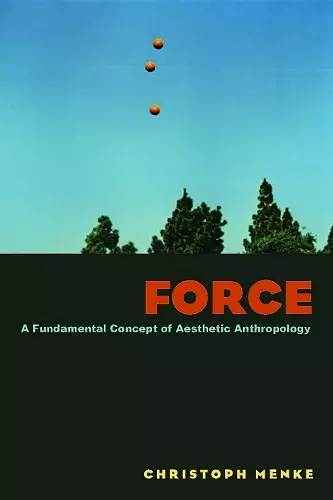Force
A Fundamental Concept of Aesthetic Anthropology
Christoph Menke author Gerrit Jackson translator
Format:Hardback
Publisher:Fordham University Press
Published:10th Dec '12
Currently unavailable, and unfortunately no date known when it will be back
This hardback is available in another edition too:
- Paperback£23.99(9780823249732)

Considers the aesthetics of force as a thinking of the nature of man: of aesthetic nature as distinct from the culture acquired by practice
This book reconceives modern aesthetics by reconstructing its genesis in the eighteenth century, between Baumgarten's Aesthetics and Kant's Critique of Judgment.
The book aims at a new exposition of the basic idea of modern aesthetics by way of a reconstruction of its genesis in the 18th century, between Baumgarten’s Aesthetics and Kant’s Critique of Judgment. The claim is that the historical invention of aesthetics was not about expanding the range of legitimate objects of philosophical inquiry—these objects all existed before aesthetics. Rather, aesthetics, by introducing the category of the “aesthetic,” fundamentally redefined these objects. But most importantly, the reconstruction of the historical genesis of aesthetics shows that the introduction of the category of the “aesthetic” required nothing less than a transformation of the fundamental terms of philosophy. What begins in—or as—aesthetics is modern philosophy.
More precisely, Force shows that in—or as—aesthetics modern philosophy began twice, in two different, even opposite forms. On the one hand, Baumgarten’s Aesthetics is organized around the new concept of the “subject”: the concept of the subject as the totality of faculties, as the agent defined by his capabilities; of the subject as one who is able. By conceiving sensible cognition and (re)presentation as the exercise of subjective faculties acquired in practice, Baumgarten has framed the modern conception of human practices (and of philosophy as the inquiry into the conditions that enable the success of these practices). That is why aesthetics, the reflection upon the aesthetic, is a central pillar of modern philosophy: in aesthetics, the philosophy of the subject or of the subject’s faculties assures itself of its own possibility.
Yet here, in the aesthetic and the reflection on it, the aesthetics “in the Baumgartian manner” (Herder), as the theory of the sensible faculties of the subject, at once faces a different aesthetics: the aesthetics of force, which conceives the aesthetic not as sensible cognition but instead as a play of expression—propelled by a force that, rather than being exercised, like a faculty, in practices, realizes itself; a force that does not recognize or represent anything because it is “obscure” and unconscious; a force not of the subject but of man as distinct from the same man as subject. The aesthetics of force is a science of the nature...
"Continental philosophers working in the area of aesthetics will find this book to be of great interest. Menke's study is brief, but compelling and highly learned-- a welcome addition to the scholarship. . Recommended." -Choice "Force is an outstanding study of the philosophical, ethical and political underpinnings of modern aesthetics and an important and original contribution to contemporary debates about the fate of modernity, philosophy, and the arts." -- -Paola Marrati The Johns Hopkins University "Menke forcefully makes the point that with the emergence of aesthetics in the eighteenth century, philosophy, and its understanding of itself, underwent a radical change." -- -Rodolphe Gasche University of Buffalo, SUNY
ISBN: 9780823249725
Dimensions: unknown
Weight: unknown
160 pages